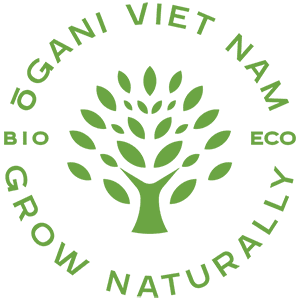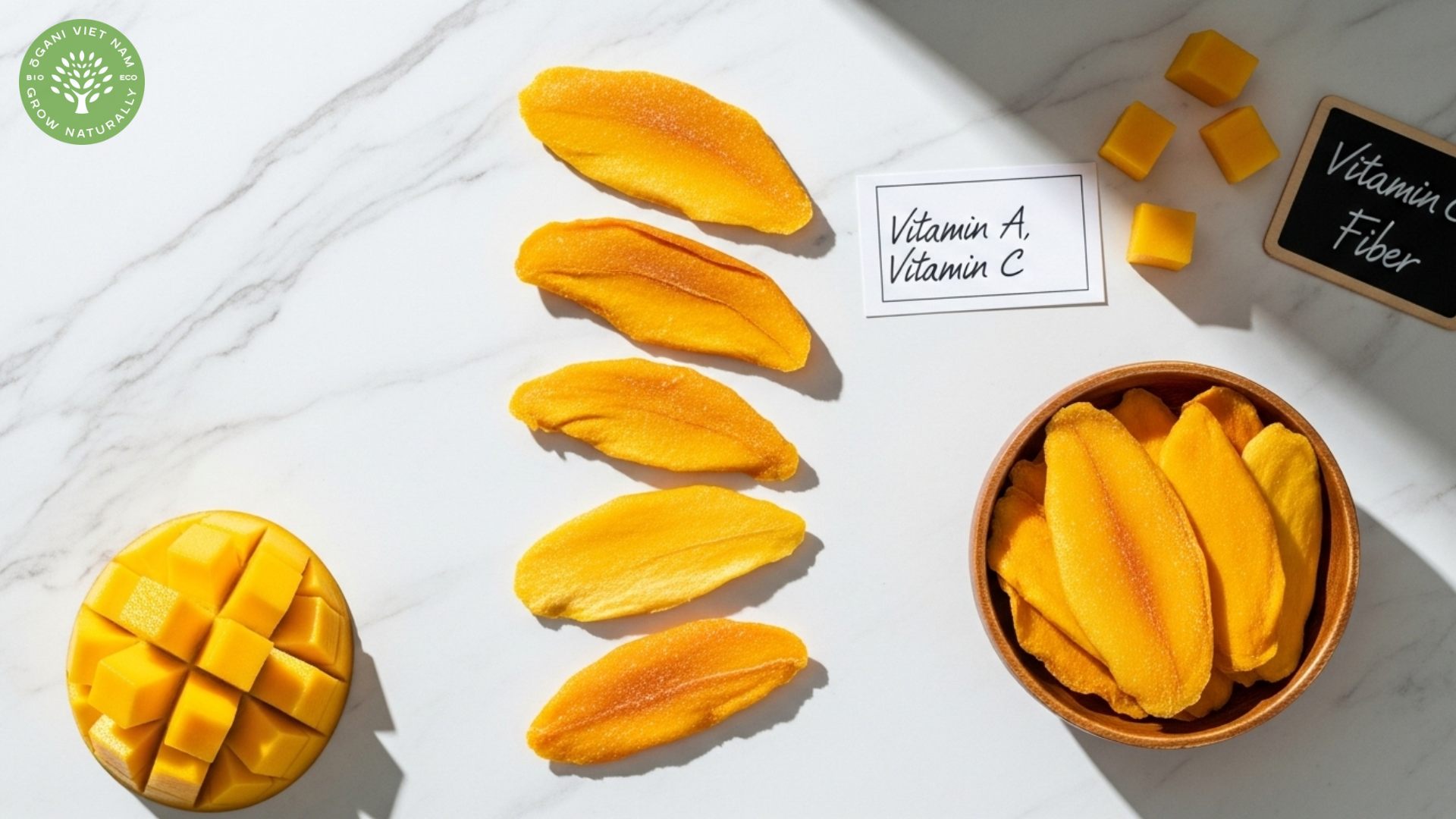When you reach for dried mango, you’re getting a concentrated source of vitamins A and C, fiber, and natural sugars—but with significantly higher calorie density than fresh mango. The nutrition of dried mango shows that a typical 100g serving delivers around 314 calories and 75g of natural sugars, making portion control essential for balanced nutrition.
Understanding the nutrition of dried mango: essential nutrients breakdown
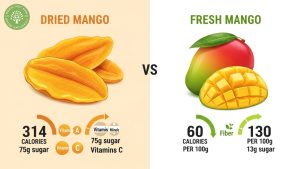
Dried mango packs impressive nutritional value into every chewy slice. Through the dehydration process, water content drops dramatically while nutrients become more concentrated—though this also means calories and sugars intensify. Understanding the complete nutrition of dried mango helps you make informed snacking decisions.
A standard 40-45g serving (about a handful) contains approximately 130-140 calories, with virtually no fat but abundant carbohydrates. You’ll find roughly 33-35g of total carbohydrates per serving, including 28-30g of natural sugars from the fruit itself. While some brands add sugar during processing, many premium varieties rely solely on the mango’s inherent sweetness.
The vitamin profile stands out impressively in the nutrition of dried mango. Dried mango provides substantial amounts of vitamin A (important for vision and immune function) and vitamin C (crucial for collagen production and antioxidant protection). You’ll also get folate, which supports cell division and DNA synthesis—particularly valuable during pregnancy or periods of rapid growth.
Mineral content includes potassium for heart health and fluid balance, small amounts of calcium for bone strength, and trace amounts of magnesium. The fiber content, typically 1-2g per serving, aids digestive health and helps moderate blood sugar spikes, though it’s considerably less than what fresh mango offers.
Here’s something most people don’t realize: that sticky, golden slice you’re chewing contains mangiferin—a powerful polyphenol compound with anti-inflammatory properties. Carotenoids like beta-carotene also survive the drying process, contributing to the fruit’s vibrant color and antioxidant capacity.
Health benefits from the nutrition of dried mango
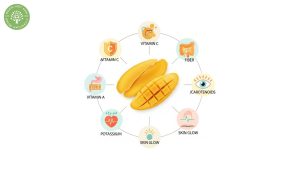
At Ogani VN, we’ve watched customers transform dried mango from guilty pleasure to intentional nutrition choice once they understand what it genuinely offers their bodies. The nutrition of dried mango delivers tangible health advantages that go beyond simple snacking satisfaction.
Supporting immune defense naturally
The vitamin C concentration in dried mango contributes meaningfully to immune system resilience. While the drying process reduces some vitamin C compared to fresh fruit, significant amounts remain—enough to support your body’s natural defense mechanisms against seasonal illnesses. Combined with vitamin A, which maintains the integrity of mucous membranes (your first barrier against pathogens), the nutrition of dried mango becomes a strategic ally during cold season.
Digestive health through pectin and fiber
The pectin content in dried mango acts as a prebiotic fiber, feeding beneficial gut bacteria. Though fiber levels drop during dehydration, what remains still supports regular bowel movements and creates that satisfying feeling of fullness. Some customers tell us they keep dried mango at their desk specifically for the 3pm energy slump—the fiber helps stabilize blood sugar better than candy or chips. This aspect of nutrition of dried mango makes it practical for maintaining steady energy throughout your workday.
Skin and vision protection from carotenoids
Those beta-carotene compounds don’t just sit there looking pretty. Your body converts them to retinol, supporting skin cell turnover and maintaining that subtle glow people associate with good health. For vision, the vitamin A derived from carotenoids helps maintain night vision and reduces age-related eye deterioration risk.
Cardiovascular considerations
The potassium content assists with blood pressure regulation by counterbalancing sodium intake. Meanwhile, research suggests that polyphenols like mangiferin may support healthy cholesterol levels when dried mango forms part of a balanced diet—not when it replaces meals or gets eaten by the bagful.
Sugar and calorie content in dried mango nutrition
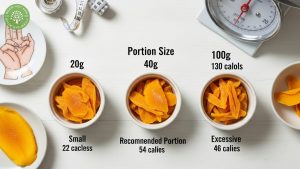
Let’s address the elephant in the room: yes, dried mango contains substantial sugar—approximately 66g per 100g compared to fresh mango’s 13-14g. This isn’t deceptive marketing; it’s simple mathematics. Remove the water, and everything else becomes concentrated.
Does this make dried mango unhealthy? Not automatically. Context matters enormously. The sugar in nutrition of dried mango is primarily fructose and glucose naturally present in the fruit, not high-fructose corn syrup or refined table sugar. Your body processes these differently than added sugars, and they come packaged with fiber, vitamins, and phytonutrients that processed sweets lack.
The real question becomes portion size. Three or four slices as an afternoon snack provides energy and nutrients without overwhelming your daily sugar budget. A full cup consumed mindlessly while watching television delivers more sugar than most people should have in an entire day.
We tell our customers at Ogani VN: treat dried mango like you’d treat dates or raisins—concentrated natural sweets that deserve respect and measurement. Check labels carefully too. Some manufacturers add cane sugar or sulfur dioxide during processing. Premium dried mango lists just one ingredient: mango. That’s what you want.
Comparing the nutrition of dried mango versus fresh mango
The transformation from fresh to dried fundamentally alters the nutritional equation in ways that matter for meal planning and health goals.
Fresh mango contains roughly 60 calories per 100g with 83-86% water content. That same 100g of dried mango packs 314 calories with only 15-20% water remaining. You’re essentially eating five mangoes worth of calories and sugar in the same physical volume.
Vitamin C takes a significant hit during dehydration—fresh mango delivers more per gram. However, vitamin A actually becomes more concentrated and bioavailable in dried form. Fiber decreases proportionally but remains present. The protein and fat content stays negligible in both versions.
One advantage fresh mango holds is satiety. That high water content fills your stomach, triggering fullness signals before you’ve consumed excessive calories. Dried mango’s compact nature makes overconsumption dangerously easy—you can eat 300 calories before your brain registers you’ve eaten anything substantial.
For practical purposes, choose fresh when you want hydration and volume with fewer calories. Choose dried when you need portable energy, shelf-stable nutrition for hiking or travel, or when fresh isn’t seasonally available. Both have legitimate places in a balanced diet.
Maximizing the nutrition of dried mango in your daily diet
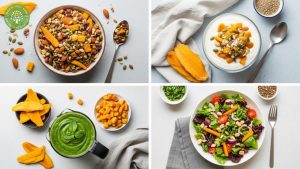
Dried mango works best as a strategic ingredient rather than mindless snacking material. Here’s how we use it at Ogani VN and recommend to customers seeking the nutrition benefits without the sugar overload:
- Pre-workout energy: Two or three slices 30-45 minutes before exercise provide quick-burning carbohydrates that fuel your workout without sitting heavy in your stomach.
- Trail mix component: Combine with raw almonds, cashews, and pumpkin seeds for balanced macronutrients—the fats and proteins from nuts slow sugar absorption while adding satiety.
- Oatmeal or yogurt topping: Chop dried mango into small pieces and sprinkle over breakfast. The natural sweetness often eliminates the need for added honey or sugar.
- Salad ingredient: Dice finely and toss into spinach or arugula salads with grilled chicken. The sweetness contrasts beautifully with bitter greens and tangy vinaigrette.
- Smoothie addition: One or two pieces blended with spinach, banana, and protein powder creates tropical flavor without needing fruit juice.
- Homemade energy bars: Process dried mango with dates, oats, and nut butter to create no-bake snack bars controlled for sugar and portion size.
The key principle remains consistent across all uses: measure deliberately. That’s unglamorous advice, but it’s what separates people who benefit from dried mango’s nutrition from those who wonder why they’re gaining weight despite “eating healthy.”
Frequently Asked Questions
Is dried mango good for weight loss?
Dried mango can support weight loss only with strict portion control due to its calorie density—about 314 calories per 100g. A small measured serving (20-30g) provides satisfying sweetness and fiber that may prevent less healthy cravings. However, eating it directly from the bag typically leads to overconsumption that undermines weight loss efforts.
How much dried mango should I eat per day?
Most nutritionists recommend 30-40g (roughly a small handful or 3-5 slices) as a reasonable daily maximum for healthy adults. This provides nutritional benefits while keeping sugar intake manageable. People with diabetes or blood sugar concerns should consult their healthcare provider and possibly reduce this amount further.
Does dried mango have the same nutrients as fresh?
Dried mango retains most vitamins A and K and many polyphenols, but loses significant vitamin C during dehydration. The minerals like potassium remain intact. The main difference is concentration—dried mango contains 5 times more calories, sugar, and most nutrients per gram compared to fresh mango due to water removal.
Can diabetics eat dried mango?
Diabetics can include small amounts of dried mango occasionally, but should monitor blood glucose response carefully. The high natural sugar content (66g per 100g) and rapid absorption can spike blood sugar levels. Pairing with protein or fat and limiting portions to 15-20g helps minimize glycemic impact. Always consult with your diabetes care team first.
Making smart choices with dried mango nutrition
The nutrition of dried mango offers genuine health benefits when approached with knowledge and moderation. Those concentrated vitamins, minerals, and antioxidants support immune function, digestive health, and overall wellness—but the sugar and calorie density demand respect and portion awareness.
At Ogani VN, we believe in transparent nutrition information that empowers smart choices. Dried mango isn’t a superfood miracle or a forbidden junk food—it’s simply concentrated fruit that deserves a measured place in a balanced diet. Choose varieties without added sugar, measure your portions intentionally, and enjoy the tropical sweetness knowing exactly what you’re getting nutritionally.
Ready to experience premium quality dried mango? Visit Ogani VN’s online store to explore our selection of naturally processed, no-sugar-added dried fruits that deliver authentic flavor and maximum nutritional value. Your body deserves real food with real benefits.
Read more:
- Dried Mangoes Benefits: Healthy Snacking With Ogani VN.
- Dried Pineapple No Sugar Added: Healthy Snack by Ogani VN
- Dragon Fruit Powder: Unlocking Ít Superfood Potential for Health and Wellness.
- Dried Mango Benefits: 7 Amazing Health Reasons To Include This Superfruit In Your Diet
- Nutrition Of Dried Mango: Complete Guide To Benefits And Facts
